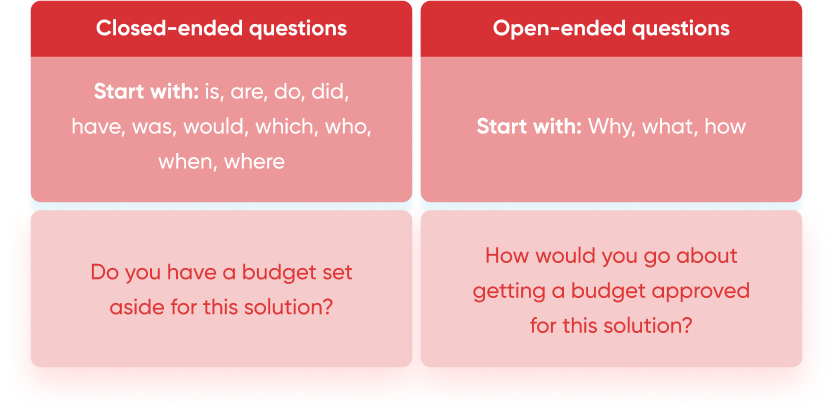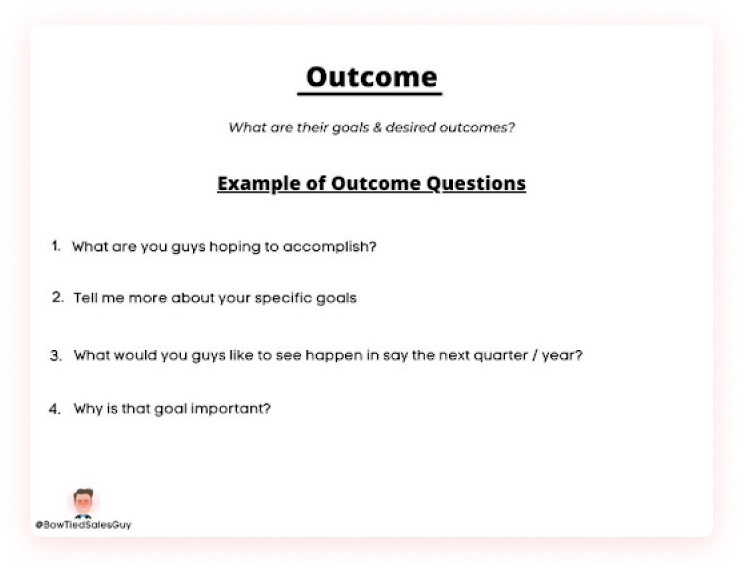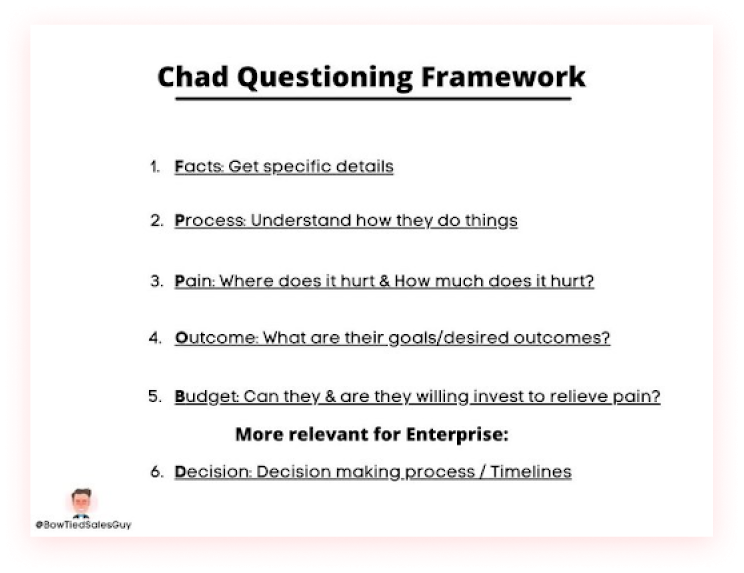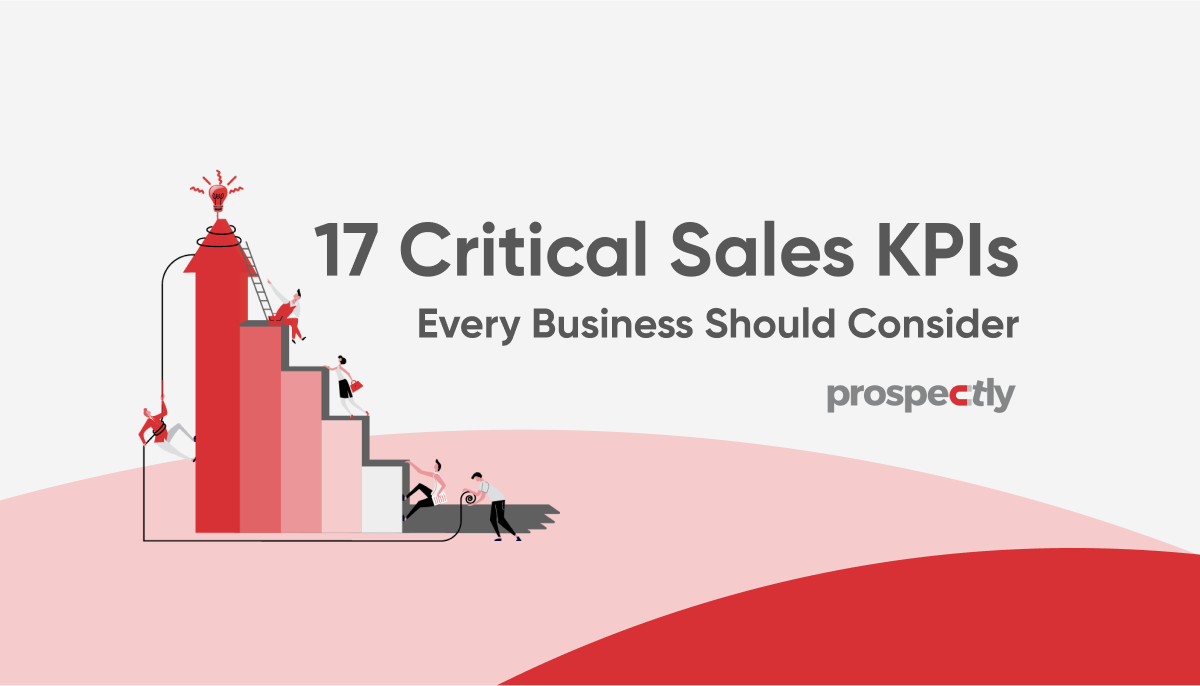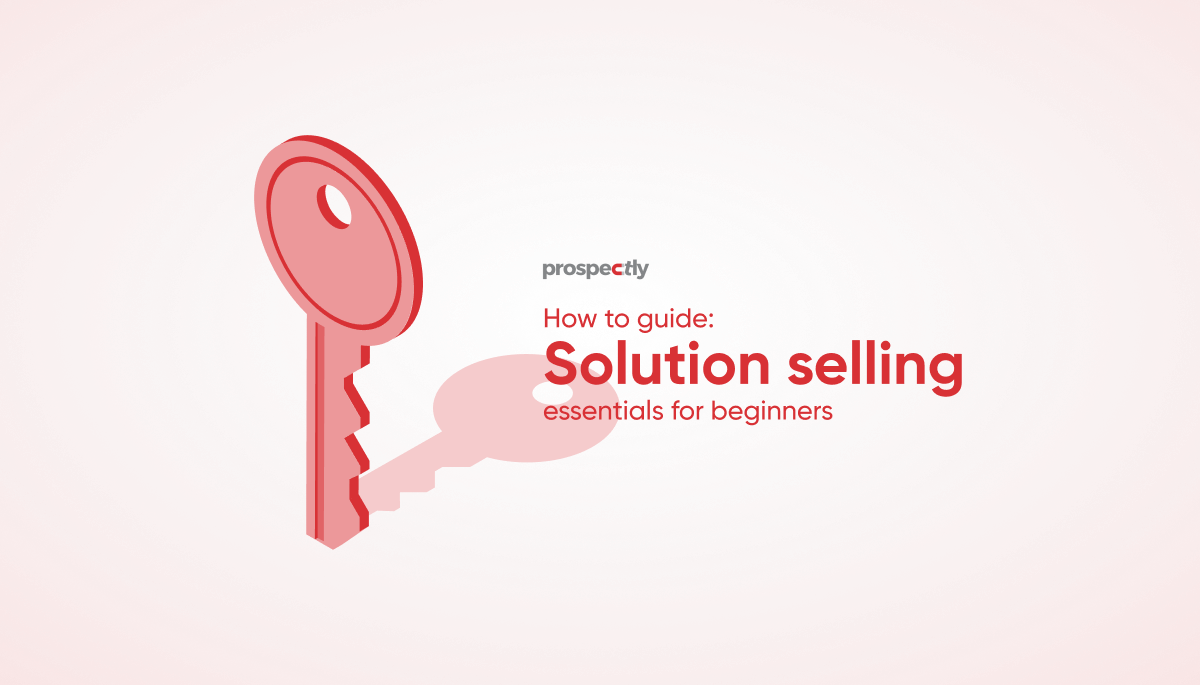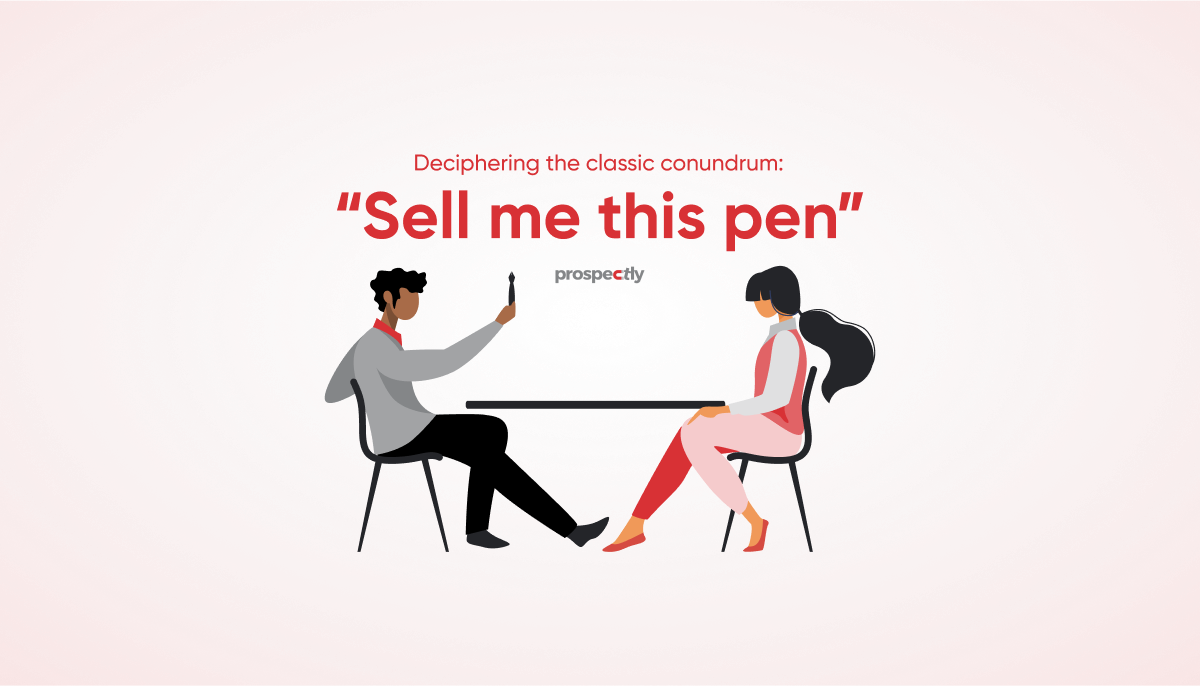19 Best sales discovery questions to close more deals
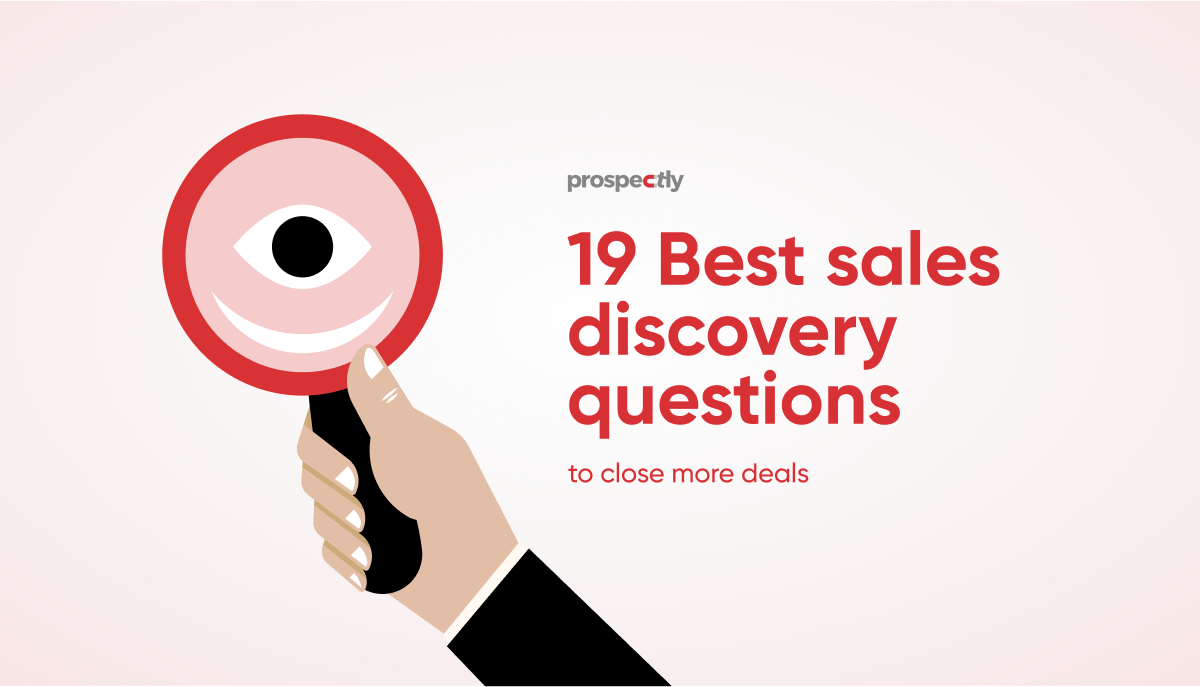
Ever heard of “talkaholism” or compulsive talking? (Etymologeek.com). Health experts say that it’s a condition where you talk more than everyone else in most situations. You can’t help but talk and talk. In sales prospecting, talking a lot about yourself and how good your company is or your products are can bore prospects to death. You’ll make yourself unlikeable and a lousy candidate for business.
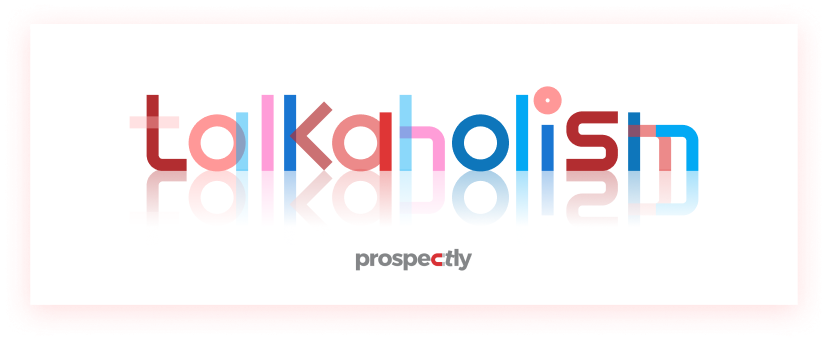
However, you can avoid talkaholism by using proper sales discovery questions. As a sales leader or rep, discovery call questions can help you open wide doors and close bigger deals. The potential customer is the center of the sales conversation during the discovery call. Read on to learn more.
What are sales discovery questions?
| Sales discovery questions are like an individual on a fact-finding mission. You set out to ask your prospects questions during your discovery call to know them better. Your primary goal is understanding their goals, challenges, and needs during the sales delivery process. |
B2B buyers say that two-thirds of salespeople are underperformers or weak (Harvard Review). Those are discouraging stats. However, it shows that reps try to sell to people with no interest in their products.
What’s the solution? Discovery questions blended with deep research about the prospect before calls are the way to go. Let’s look at why sales managers should emphasize discovery call questions to their sales professionals.
Why do you need sales discovery call questions?
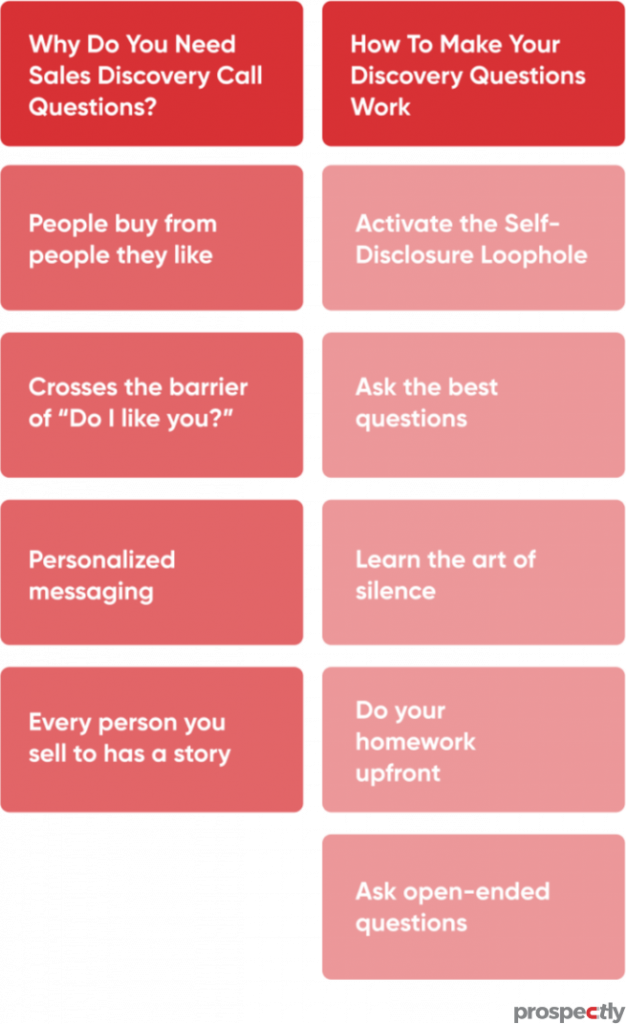
- People buy from people they like
Jeb Blount is the author of Fanatical Prospecting and the producer of Sales Gravy Podcast. He has over 30 years of selling experience.
In one of his podcasts, Jeb says that technology changes. But there’s one thing that remains the same. People buy from people they like.
It means you should show you’re more interested in the prospect’s pain points than selling your product. Proper discovery questions you ask the potential customer at the right time during your sales call can create trust. Trust leads to a relationship and increased chances of success.
- Crosses the barrier of “Do I like you?”
A prospect has one question in their mind when you call. Do I like this person? The first few seconds during your discovery call can make or break you.
Many sales professionals make one problem of talking more about themselves, their company, and their product. It makes you unlikeable to the potential buyer. As a result, they switch off and lose interest.
But right discovery call questions will make the qualified prospect tick the checklist box. Do you like me? Do you make me feel important? Do you listen to me?
Once you cross the hurdle, it’ll be easy to do business with the prospect.
- Personalized messaging
Asking questions makes you understand the potential customer’s lingo and what matters to them. In the scheduled meeting, you can use the prospect’s language and pain points during your product demo.
- Every person you sell to has a story
Every individual that you want to sell to has a story. They’ve got something to tell. Your prospect’s job could be on the line, their company might be facing challenges, or the future could be bleak.
When you ask questions, you show that you understand the person’s story. The more you let the buyer tell their story, the more you uncover their pain points.
How to make your discovery questions work?
Discovery calls on their own aren’t enough to close bigger deals. There are several principles you must follow.
Here’s the thing.
- Activate the Self-Disclosure Loophole
It’s a technique that Jeb of Sales Gravy Podcast uses. Think of a time when you said personal stuff about yourself to some people you wouldn’t have talked about in any situation.
Why did you continue on the path of self-disclosure? Your listeners let you talk.
Jeb says that when you start talking, you’ll begin to self-disclose. And when you self-reveal, the pleasure senses of the brain begin to light up like a Christmas tree.
While you’re on a discovery call, stay out of the way. Let the prospect talk about themselves. Allow the likely buyer 30 mins or more to chat after asking about their challenges.
- Ask the best questions
The best questions that a salesperson can ask anyone are ‘tell me more,’ ‘how so,’ ‘why so,’ and saying ‘um that’s interesting,’ to show that you’re in tune with the conversation.
Saying ‘um, that’s interesting’ also indicates to the prospect that you want to learn more. The prospect will get encouraged to reveal more about their problems and dreams.
- Learn the art of silence
The most effective SDRs know when they must be quiet. Some reps lose prospects because they plunge into questions and rush through the discovery call.
After asking a prospect a question, let there be silence. Let them absorb the question and respond before you bombard the potential buyer with another one. You can pause for five seconds or more.
The potential customer will see that they’re important in the conversation. You’re not on the discovery call to sell but to empathize.
- Do your homework upfront
Discovery calls can be successful if you research before you call the prospect. Know the person you’ll talk to, their industry, work, job roles, interests, or anything that’ll reduce communication barriers.
Jeb gives an example about a prospect whose children went to the same college as his. According to Jeb, he got the customer’s Facebook profile info to learn more about the person. During the discovery call, Jeb talked about the college. To his surprise, the prospect said more about the school. As a result, the conversation was now like a friend talking to another friend.
The rest is history. As a sales leader, you should stress the importance of deep research about prospects to your team.
- Ask open-ended questions
Earlier, we said it’s critical to say things like, ‘how so’ to encourage the potential client to open up. Yes or no questions can limit the conversation to basic info. Saying, “tell me about the structure of your team,” is better than “is your team made up of SDRs and AEs?” See more examples below.
Open-ended questions are great because they encourage the prospect to open up. They also show the potential buyer you’re paying attention to them. The more they talk, the more the prospect reveals crucial info.
Also, the questions should move the needle. It means that every question you ask should take you to the next step to qualify or disqualify the prospect.
Explain to the prospect the purpose of the sales discovery call. Then say, “If it’s okay with you, I’d like to learn a little bit more about you. After this, we can talk about XYZ in a few minutes.”
You’re giving the person an option to yes or no to your request to converse with them. While it’s a brilliant idea to have a list of questions, you’re not a police officer. You’re not on the discovery call to interrogate the prospect.
Be conversational and organic. Let the buyer’s emotions be your guide in asking the right questions. You’ll have a great discovery call.
Here are more examples of open-ended questions for your discovery call.
19 best sales discovery questions to open more doors and close bigger deals to rock your commission cheque
Now let’s get to the what part of the discovery questions. How can you set the ball rolling to have a successful discovery call?
- Nailing the beginning of the discovery call
@BowTiedSalesGuy recommends the following techniques for opening your discovery call after you’ve made an intro.
You: So, it’s good to connect, John. Can you tell me what you were hoping to get out of this meeting?
Prospect: Uhh, just wanted to learn more.
You: Ok. Can you be more specific?
Prospect: Yeah, was interested to see how you’re different than X and to see how your product works.
You: Cool. So, before we get started, can we agree on a couple of things? By the end of this meeting, one of two things will happen. Either of us can say it’s not a good fit, or we both agree to move to the next steps to see a live demo. Works for you?
Prospect: Yeah, sure.
You: Cool. Let’s say our product does exactly what we say it could. Fast forward a few months from now, what would need to happen for you to feel it was the right decision working with us?
Prospect: XYZ (Desired outcome)
You: Interesting. Why is (desired outcome) important?
The first two questions put the prospect at ease and give them the freedom to drop the call or not. Asking the potential customer about their outcome helps you associate your solution with the prospect’s needs.
You’ll know the exact problems the person wants to solve. Use the below framework to pause more questions about outcomes and create a good rapport with the prospect.
Example of Outcome Questions
- What are you hoping to accomplish?
- Tell me more about your specific goals.
- What would you like to see happen in the next quarter/year?
- Why is that goal important?
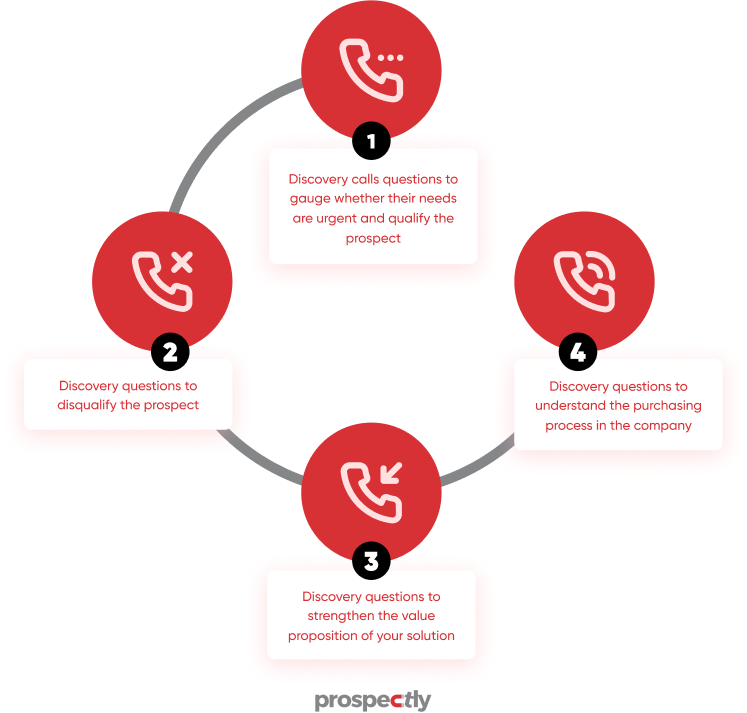
Discovery calls questions to gauge whether their needs are urgent and qualify the prospect
- What’s your priority regarding this need?
You want to probe further to know what the prospect’s priorities are. Do they want the solution now?
- How does your whole company see this as a top priority?
Also, find out if the prospect has buy-in from the company’s key decision-makers. - Talk to me about your company’s objectives in the coming year.
Take a step further to discover if your solution is a good fit for the company’s goals. - Can you tell me about the roadblocks related to (what your product intends to do) that can be a challenge in achieving your goals?
You can also ask questions to see if your product or service can remove the roadblocks to the company’s success. - If your company didn’t opt for the product, what plan does it have to deal with the problem?
The answer to the question will let you know whether the company has any strategy to solve its challenge.
You can use the Chad Questioning Framework to qualify the prospect.
Facts: Get specific details.
Process: Understand how they do things.
Pain: Where does it hurt, and how much does it hurt?
Outcome: What are their goals/desired outcomes?
Budget: Can they and are they willing to invest in relieving pain?
Decision: Decision-making process/Timelines
Discovery questions to disqualify the prospect
Another critical step is to ask questions to disqualify the prospect.
- What’s your timeframe in implementing the solution?
You ask the question to know if your timeline for implementing the potential solution matches your prospect’s schedule. If the timelines are different, the prospect is outside your plan. - What would you do to get a budge approval for the solution?
Here, you want to know if the company’s funds are enough.
Discovery questions to strengthen the value proposition of your solution
- What are the likely results if the problem isn’t solved?
It’s a good question you can direct to a decision-maker to emphasize the risks of not resolving the problem. You want to rub more salt on the wound. - What impact will it have on others?
It helps the prospect see how the unresolved problem will affect the other team members. - What primary metric does your team use to measure progress? If your team got the right solution, how will it affect the metric?
The sales discovery call question helps the potential client realize the connection between the solution and the metric. - If your key metric increases by [percentage], how will it impact your overall performance?
E.g., If your revenue increases by 20%, how will it impact your overall performance?
Your prospect will visualize an improvement in their key metric. - How would your team’s success look with the new solution?
The potential buyer will see themselves using the solution.
Discovery questions to understand the purchasing process in the company
- Looking at the solution, what are the crucial features that influence your choice for the product?
It shows the product features the prospect sees as essential. The product aspects could include its functions, ease of use, price, etc. - How often has your company bought the same solution?
The answer will make you aware of the number of times the company purchases a solution like yours. You’ll also know the prospect’s buying process. - Tell me about other people in your company who’re looking for a solution to the problem.
You ask this question to be clear about other crucial decision-makers who’ll influence the purchase of the solution. - How do you go about determining your vendor for the solution?
It lets you know the likely questions the key decision-makers can ask you in the following sales process. The info can hone your sales pitch in your product demo. - If I could offer you the perfect solution to solve your problems, what other people would become part of the process?
The prospect will tell you the exact people in charge of the buying process.
- Which are other team members could benefit from the solution?
There could be other influential people who should also be persuaded about the solution.
Wrapping up
Sales discovery questions can open wide doors and help you close more deals. However, sales professionals should try to be organic as far as possible to make the discovery call conversational. The questions aren’t for interrogating the prospect but for leading them to self-disclosure. Avoid bombarding them with question after question. Give the prospect time to respond and let them do the most talking to close more deals.
